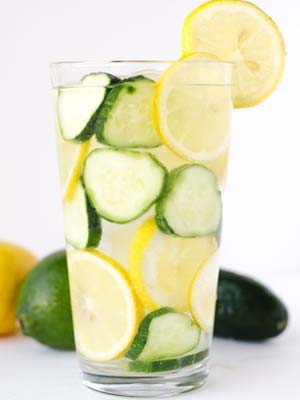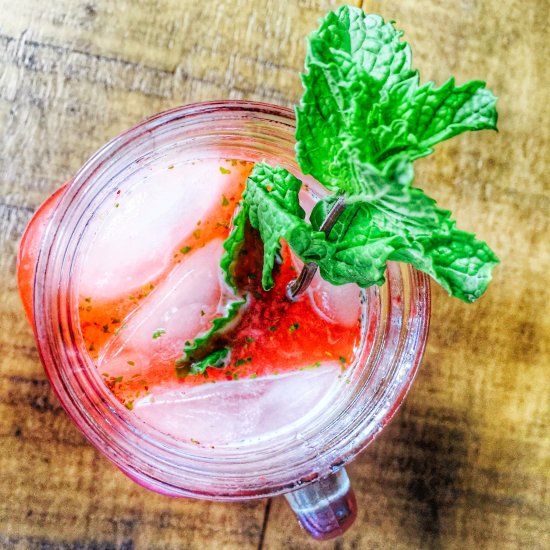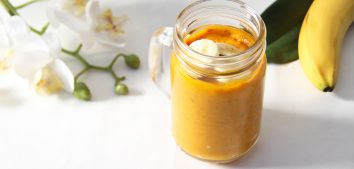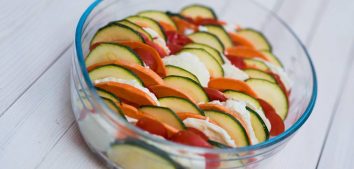
What’s best to drink on hot days?
It would be hard to overestimate the role of beverages when it’s scorching hot outside. Luckily, the human body has its own thermoregulatory mechanism.
Its primary tool, so to speak, is sweating. However, when we sweat, our body gets rid of electrolytes, and thus providing it with water alone may not be enough. Leaching magnesium and potassium may lead to cramps, for instance. Therefore, let’s become friends with isotonic drinks, preferably the homemade ones. The easiest to make is water with salt (9 g per 1 liter of water) and juice of one whole lemon. Other than that, avoid consuming cold drinks after working out. The best are those kept at room temperature.
When your body overheats, you may experience the following:
- feeling of heat
- feeling of weakness
- dizziness
- muscle cramps
- congestion of the face
- loss of balance
- blurred vision
Bear in mind that these symptoms can simply occur on a hot day – not just during training.
The aforementioned are the main symptoms of a slight overheating of the body. At this point, it’s important that you react immediately. Shelter in the shade from the sun, have a sip of a cool isotonic drink, lie down, and keep your feet higher than the rest of the body. If possible, use an ice pack or soak a piece of cloth or a small towel in cold water and put whichever you choose on your neck, armpits, and groins. If the symptoms don’t subside after about 15 minutes, a medical intervention will be necessary.
On very hot days, I recommend this refreshing drink to you:
A cucumber-ginger lemonade
– Mineral water, lightly carbonated +:
- ginger (diced or grated)
- pomegranate juice
- slices of lemon and lime
- raw cucumber, unpeeled (you can also cut it into slices)
- tablespoon coconut sugar or other malt
- ice cubes
And what are the health benefits of this coctail’s ingredients?
POMEGRANATE:
- used in the prevention of heart and cardiovascular diseases (arteriosclerosis, hypertension, helps reduce calcification and dissolve unwanted deposits)
- has an antioxidant effect, which is to say that it protects the body against harmful free radicals
- does not raise blood sugar levels
- inhibits tumor growth – prevents production of new tumor cells (e.g., prostate cancer, breast cancer, colon cancer, lung cancer)
- inhibits the development of inflammatory processes
- aids enzyme activity
- has a protective effect on the fetus
- helps eliminate erectile dysfunction
- enhances erotic sensations
- slows down or even prevents aging processes
- rich in vitamin C, niacin, potassium, fiber, protein, and organic acids.
GINGER:
- aids digestion – also recommended for flatulence!
- has an analgesic, antipyretic, and anti-inflammatory effect – it sounds like something you can find on a painkiller pack :), but it’s true. Moreover, it reduces inflammation, relieves pain, and lowers the body temperature, so it is just amazing when it comes to treating colds.
- perfect for travel sickness. In this case it’s worth replacing traditional medicines with natural ginger.
- relieves nausea in pregnant women. However, keep in mind that ginger irritates your digestive system, so it is best to use it in smaller quantities and with greater caution, e.g., treat yourself to a tea with ginger root extract.
- relieves menstrual pains
- has an anticoagulant effect – used to prevent the formation of clots in blood vessels.
- reduces cholesterol concentration
- reduces swelling
- has refreshing properties – you can gargle with it. In a glass of warm water, dissolve 2 teaspoons of powdered root, or mix it with a decoction of a boiled fresh ginger
- improves memory and concentration
- increases the metabolic rate, and thus accelerates the burning of fat and carbohydrates.
- cures migraines
- improves blood circulation, has a warming effect on the body, including the genitals (considered an aphrodisiac).
- thanks to its warming and circulation-stimulating properties ginger is often added to cosmetics which are supposed to combat cellulite and have a slimming as well as modeling effect
LEMON:
- in addition to being an excellent source of vitamin C and bioflavonoids, it also contains small amounts of calcium, phosphorus, potassium, and carotene
- lemon juice has properties which can aid in the fight against colds, sore throat, laryngitis, rheumatism, allergy, and diarrhea
- destroys dangerous germs
- purifies the blood
- helps lose weight
- strengthens blood vessels
- when drunk before meals, lemon juice improves digestion
- fresh lemon can also be used to flavor salads, make lemonade, and prepare lemon tea
- its peel is also useful – it gives a pleasant lemony aroma to virtually any dish
- to fully benefit from the fruit’s properties, use only fresh lemons. Never replace them with readymade juice in a bottle.












Comments No Comments
Join the discussion…